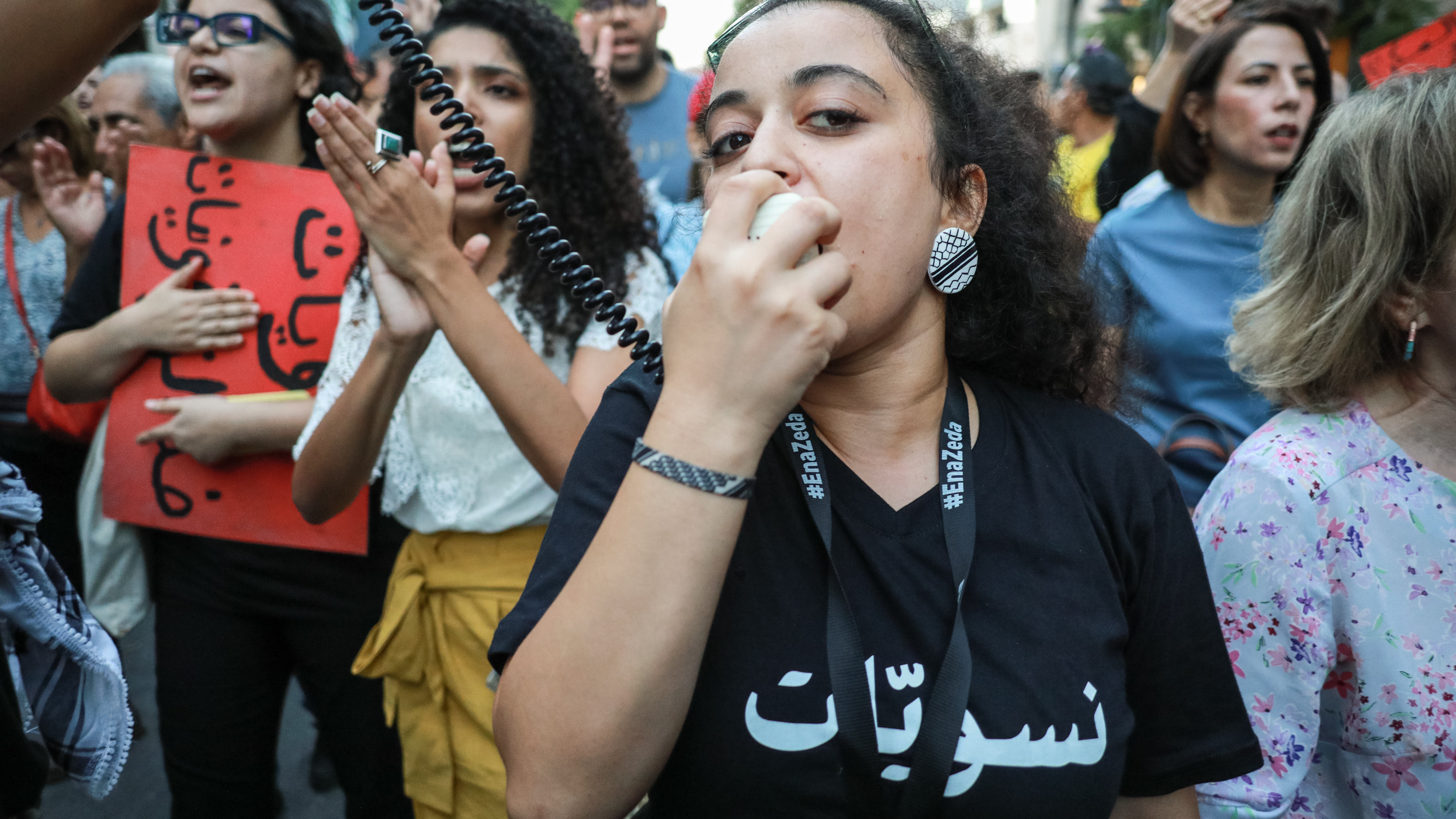A century of Arab feminism

"We want to finally speak for ourselves. We are not just poor, oppressed victims who need to be rescued by the West," declared the Emirati author and columnist Dubai Abulhoul resolutely and emphatically at the 2023 Abu Dhabi Book Fair. Claudia Mende, an author specialising in the Middle East and North Africa and a former Qantara editor, made this demand her mission. In her new book "Wir sind anders, als ihr denkt" (We are not what you think), she traces the struggle of Arab women to achieve autonomy in their lives and end male dominance.
Notably, Mende has interviewed activists, lawyers, gender researchers, sociologists, journalists and LGBTQ+ activists from Egypt to Tunisia, from Lebanon to Saudi Arabia, to hear their stories. These interviewees provide direct insight into their struggles, challenges and achievements. Mende succeeds in giving her readers the feeling of being present during these conversations, with social workers, women’s rights activists and business consultants from Marrakech and Rabat to Amman.

The book's thematic range is striking, covering topics such as the role of Arab women in the anti-colonial struggle, their confrontation with state feminism, the emergence of Islamic feminism, LGBTQ+ rights, virginity, abortion, genital mutilation, and sexual violence, among others.
It offers a nuanced portrayal of the diversity within Arab feminism while simultaneously holding up a mirror to Western audiences. Why do images of a "misogynistic Islam" and the "passive, oppressed Arab woman" persist so tenaciously? The book is an appeal to finally break free from the one-sided media focus on headscarves, forced marriages and honour killings.
Moreover, it calls on European readers to reflect on the role played by their own puritanical ideas, which were exported to Arab countries during the colonial era. Same-sex love, for example, was historically tacitly accepted in many Arab societies. It was only through confrontation with European thought patterns that a clear line was drawn between permitted and forbidden sexuality.
Similiaries and differences to Western feminism
Mende traces the development of women's movements through the political and social contexts of their historical moments and locations, while drawing parallels between the growing feminist movements in the Arab world and the West. She uses this approach, for example, in her analysis of the birth of Arab feminism, which she traces back to a group of middle- and upper-class Egyptian women organised around Hoda Sha'rawi in the 1920s. These women were the first to formulate new ideas around child marriage and divorce, which was effectively impossible for women at the time.
In this phase, the feminist struggle went hand in hand with the struggle for national independence and was shaped by the central questions of the era: why is the Islamic world lagging behind Europe? Is it necessary to discard one's own culture to overcome misogynistic beliefs? These women formulated their demands primarily for themselves, not for more disadvantaged women like domestic servants, factory workers or the rural population. As Mende points out, this limited focus was also a feature of "first-wave" feminism in Europe and the USA.
Another important contribution to the growth of Arab women's movements came from the pioneers of a new liberal, reform-oriented and feminist Islam, which Mende discusses in detail. This movement emerged after the defeat suffered by Arab nations at the hands of Israel during the 1967 Six-Day War. With that defeat, the secular belief in progress that was propagated by socialist regimes in Egypt, Syria and Iraq lost much of its persuasive power.
The result was a shift to the right in Arab societies and the rise of political Islam. To this movement, Islamic feminism emerged as an "unwanted child", according to Iranian researcher Ziba Mir-Hosseini. This new feminist movement set out two main lines of attack: against the paternalism of Western feminists, and against a misogynistic reading of the Quran that serves to justify patriarchal structures.
These religious women developed their own interpretation of the holy texts and used them to argue for autonomy, freedom and equality. These groups—whose membership ranged from radical to more conservative voices—were rediscovering historical female religious scholars and working to democratise Islamic jurisprudence, which was exclusively carried out by men. Today, Islamic feminists in the USA, Great Britain and South Asia are continuing this fight.
A crumbling patriarchal system
Mende expertly demonstrates how lived realities, gender roles and the feminist movement have transformed over the decades, often under challenging political conditions and amid tensions between traditional notions of family and modern legal concepts.
The book also tells the story of the 2011 Arab Spring, and how women played a far greater role than is generally assumed. It describes the work of women such as Egyptian activist Asmaa Mahfouz, the Nobel Peace Prize-winning Yemeni journalist and activist Tawakkol Karman and many others. It explains why White Western feminism still fails to recognise, due to the legacy of colonialism, the struggles of many women fighting inequality in the Global South.

The Female Face of the Revolution
One year on from the uprisings that toppled dictators Ben Ali and Mubarak, the revolution is still going on for many women activists in Egypt and Tunisia. Martina Sabra's essay takes a look at how strong their socio-political influence really is
Over the last century of feminist struggle, social realities have changed. Economic conditions, for example, have forced many men to work abroad, making women the heads of their families. Mende shows the creativity with which women have circumvented the "virginity test", carried out in some parts of the world to test premarital virginity.
In Egypt, Jordan and Qatar, 40 percent of marriages now end in divorce. The present reality is shaped by the fact that the patriarchal system is crumbling. In many places, however, the legal situation still lags behind social change.
Forging new solidarities
In her final chapter, Mende reminds us in no uncertain terms that Western governments, driven by economic interest and fears of migration, are supporting regimes that prevent women from fighting for their rights. From a feminist perspective, she argues, solidarity with Arab women must be based on an understanding of the economic and political circumstances, and thus of Western co-responsibility.
To support her argument, Mende turns to one of the world's worst ongoing humanitarian disasters: "The number of women and children killed in the Gaza war is particularly high; according to UN figures, it is said to be 70 percent of all victims. Palestinian women have been deprived of international solidarity for a long time. Feminist solidarity here must mean recognising the suffering of victims on all sides and seeking non-violent solutions for all," she writes.
"Wir sind anders, als ihr denkt" is a well-informed, clearly written and important book. It's a vital contribution at a time when the dominant discourse is increasingly shaped by a retreat into black-and-white thinking, and as women in the West, from the USA to Poland, begin to sense that their hard-won rights and freedoms are fragile and must be defended—collectively and as equals.
Wir sind anders, als ihr denkt
Claudia Mende
Westend Verlag 2024
176 pages, €16,99
© Qantara.de

